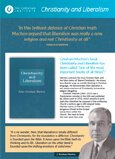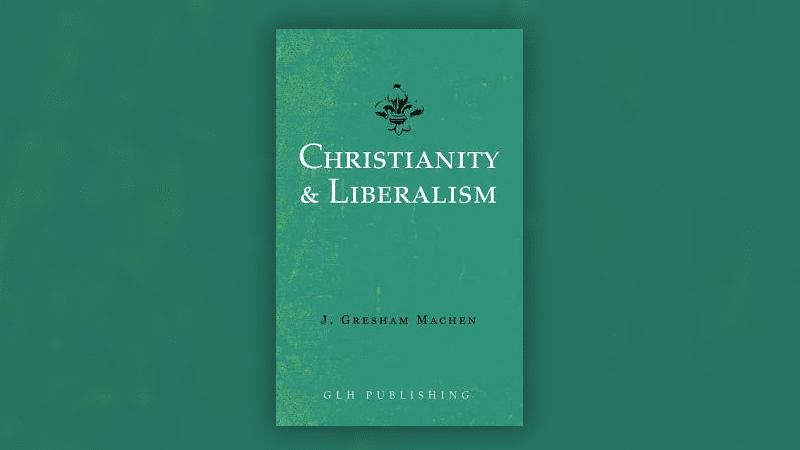
Christianity and Liberalism
Gresham Machen’s book Christianity and Liberalism has been called “one of the most important books of all times”.

One hundred years ago, in February 1923, Christianity and Liberalism was published. The message was stark. Many Christian leaders of the day were preaching a false Gospel. They weren’t promoting Christianity at all, but a different religion.
The author, Gresham Machen, did not expect to win popular acclaim by making these claims. But he wrote the book because he was convinced that when a Christian church abandons confidence in the absolute authority of God’s Word, it may as well close the doors.
Many nineteenth century theologians believed the only way to make Christianity credible in the scientific age was to ‘demythologise it’, explaining away the supernatural elements. Human reason was placed over Scripture – judging what was credible to modern ears, and what could be left behind in the ‘superstitious’ past. Machen had studied theology in Germany under some of the leading liberal theologians of the day. He had, for a while, been attracted by their claims, and captivated by what seemed to be their deep devotion to Christ.
But he was ultimately convinced that liberal theology destroyed confidence in the Bible as the Word of God. The text of Scripture is inspired by God, it is reliable and without error (2 Timothy 3:16). If you strip the supernatural out of the Christian faith, you end up with another religion: “It is no wonder, then, that liberalism is totally different from Christianity, for the foundation is different. Christianity is founded upon the Bible. It bases upon the Bible both its thinking and its life. Liberalism on the other hand is founded upon the shifting emotions of sinful men.”[1] (Bold emphasis added)
Machen believed that at the “root of the modern liberal movement is the loss of the consciousness of sin.”[2] He concluded: “The greatest menace to the Christian Church today comes not from the enemies outside, but from the enemies within; it comes from the presence within the Church of a type of faith and practice that is anti-Christian to the core.”[3]
When the Gospel is diluted in order to make it appealing, it is no longer the true Gospel at all. When the pioneers of liberal theology set out to ‘rescue’ Christianity from those who despised it, they watered it down so that it could be safely ignored.
Machen was a leader in the formation of Westminster Theological Seminary in 1929. He was expelled from the American northern Presbyterian church for his resolute stand in 1936, and the following year, he became the first Moderator of what became the Orthodox Presbyterian Church. At the time of his death in 1937, theological liberalism was still dominant in universities and seminaries around the world.
Although nineteenth century theological liberalism ultimately fell out of fashion, today we see many within the professing church placing human experience above Scripture. In our therapeutic culture, failure to celebrate someone’s lifestyle, or refusal to endorse their claims about identity, are viewed as hateful. Affirmations of absolute moral truth are viewed as harsh and intolerant. That is why we see leading figures in the Established Church justifying the ‘blessing’ of relationships that the Word of God declares to be sinful.
We can respect people as people, without having to affirm their lifestyles, or their claims about their identity. We must always oppose bullying or cruelty. But there are many testimonies of people who have converted to Christ who look back with gratitude at those who graciously pointed them to biblical truth.
How should we regard Christian leaders who deny the truth of Scripture? With Machen, we believe that those who set aside the truth of Scripture are not preaching the Gospel at all. What they offer is not ‘Christianity’. It is another religion. A ‘gospel’ stripped of any demand for repentance has no power whatever. But, throughout the world, there are Christian churches and Christian believers who affirm that God is there, and he is not silent. And it is the churches that confidently proclaim the truth of God’s Word which are growing, in some countries despite fierce persecution.
The grass withers, the flower fades,
but the word of our God will stand forever. (Isaiah 40:8)
Adapted from Chapter 6 of Sharon James’ book The Lies we are Told: The Truth we must Hold (Christian Focus, 2022).
Further Resources on Gresham Machen: https://www.christian.org.uk/resource/christianity-and-liberalism/
Gresham Machen – The Christian Institute

Gresham Machen’s book Christianity and Liberalism has been called “one of the most important books of all times”.
[1] Machen, G, Christianity and Liberalism, Eerdmans, 2009, p. 67, emphasis mine.
[2] Machen, G, Christianity and Liberalism, Eerdmans, 2009, p. 55, emphasis mine.
[3] Machen, G, Christianity and Liberalism, Eerdmans, 2009, p. 135, emphasis mine.
By Sharon James, Social Policy Analyst